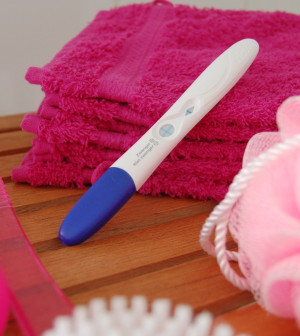- Could Your Grocery Store Meat Be Causing Recurring UTIs?
- Are You Making This Expensive Thermostat Error This Winter?
- Recognizing the Signs of Hypothyroidism
- 10 Strategies to Overcome Insomnia
- Could Artificial Sweeteners Be Aging the Brain Faster?
- Techniques for Soothing Your Nervous System
- Does the Water in Your House Smell Funny? Here’s Why
- Can a Daily Dose of Apple Cider Vinegar Actually Aid Weight Loss?
- 6 Health Beverages That Can Actually Spike Your Blood Sugar
- Treatment Options for Social Anxiety Disorder
Host of Factors Influence Baby’s Immune System


Numerous factors influence the makeup of bacteria in the digestive system, which then alters the immune system and changes susceptibility to allergies, researchers report.
The team at Henry Ford Hospital in Detroit conducted six studies of gut bacteria in babies and found that they varied by: the mother’s race/ethnicity; how long the baby spent in the womb; exposure to tobacco smoke before and after birth; cesarean or vaginal birth; and whether there were pets in the home.
“For years now, we’ve always thought that a sterile environment was not good for babies. Our research shows why,” lead investigator Christine Cole Johnson, chair of the public health sciences department at Henry Ford, said in a hospital news release.
“Exposure to these microorganisms, or bacteria, in the first few months after birth actually help stimulate the immune system,” she explained.
“The immune system is designed to be exposed to bacteria on a grand scale. If you minimize those exposures, the immune system won’t develop optimally,” she added.
The researchers also found that at one and six months, the gut bacteria of breast-fed babies were different than the gut bacteria of babies who weren’t breast-fed. These differences may affect immune system development, they said. For example, breast-fed babies were less likely to develop allergies to pets at the age of 1 month.
Children with asthma who had nighttime coughing or flare-ups also had distinct gut bacteria populations during their first year of life, the findings showed. In addition, gut bacteria was associated with levels of cells that regulate the immune system.
The studies were to be presented Saturday at the American Academy of Allergy, Asthma & Immunology annual meeting in Houston.
Research presented at meetings should be viewed as preliminary until published in a peer-reviewed journal.
The findings add to growing evidence that early childhood exposure to microbes affects immune system development and allergy risk, Cole Johnson said.
“The research is telling us that exposure to a higher and more diverse burden of environmental bacteria and specific patterns of gut bacteria appear to boost the immune system’s protection against allergies and asthma,” Johnson concluded.
More information
The U.S. National Institute of Allergy and Infectious Diseases has more about the immune system.
Source: HealthDay
Copyright © 2026 HealthDay. All rights reserved.










